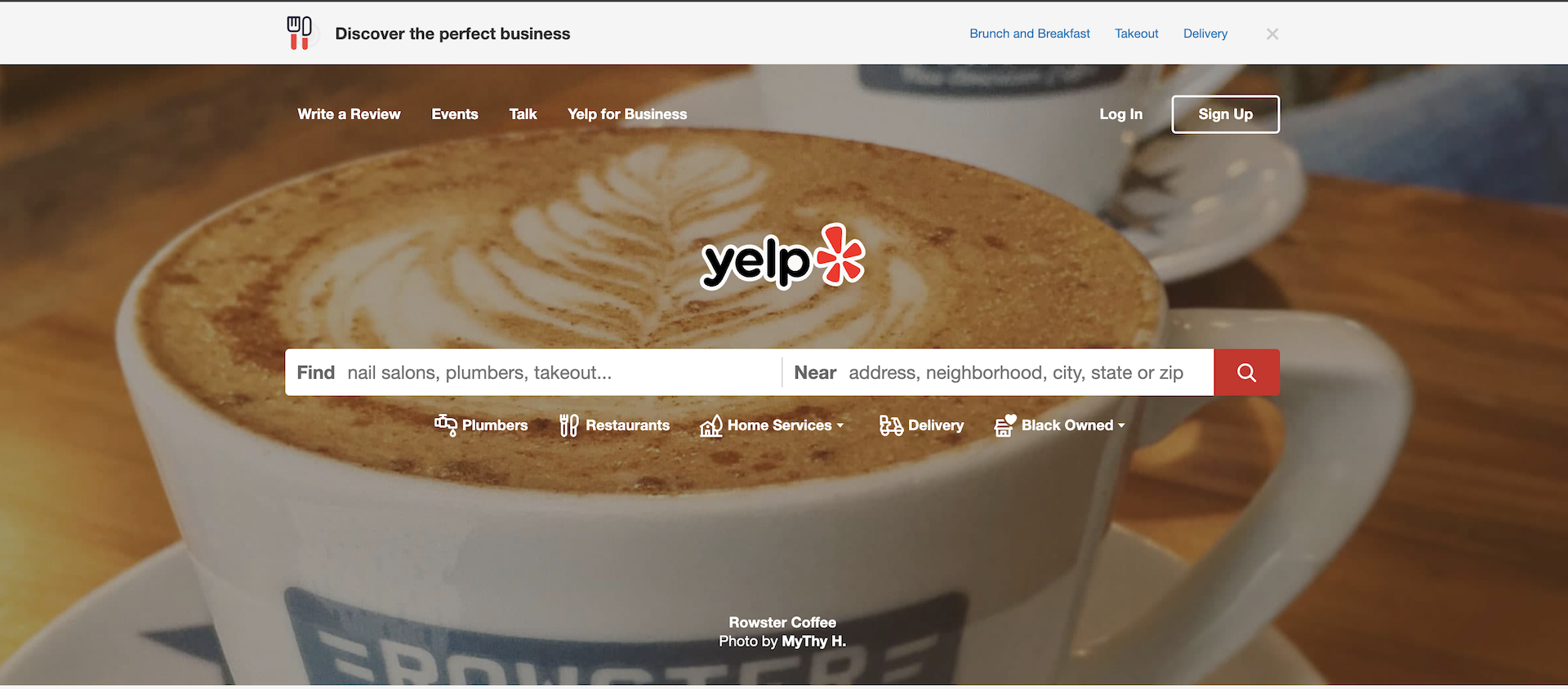Most Competitors Ignore Tip #4
Chances are, if you open up a phone book or do a Google search, there are about a dozen other contractors in your area.
So, what sets you apart from the competition?
The truth is, you don’t need to be the best contractor or exploit a niche to get customers. You don’t even need loyal customers or a hundred five-star reviews.
You can bypass much of the competition simply by having a good website and understanding local SEO.
Since 81% of customers conduct an online search before purchasing, you need to be the first website or business listing they see.
This guide will show you step-by-step how to be that first website using tried-and-true, EASY local SEO strategies designed for general contractors and construction businesses.
What is Local SEO?
Local SEO is an online marketing strategy designed to optimize a business’s website and third-party accounts for local search.
Essentially, whenever someone searches “general contractors near me” or “general contractors (insert city”), you want your business to show up #1.
To achieve these results, you’ll need to research keywords, optimize your Google Business profile listing, and even acquire links and referrals from other websites.
In addition, contractors would be wise to optimize listings over various niche websites, such as Angi, Houzz, the Better Business Bureau, and Yelp.
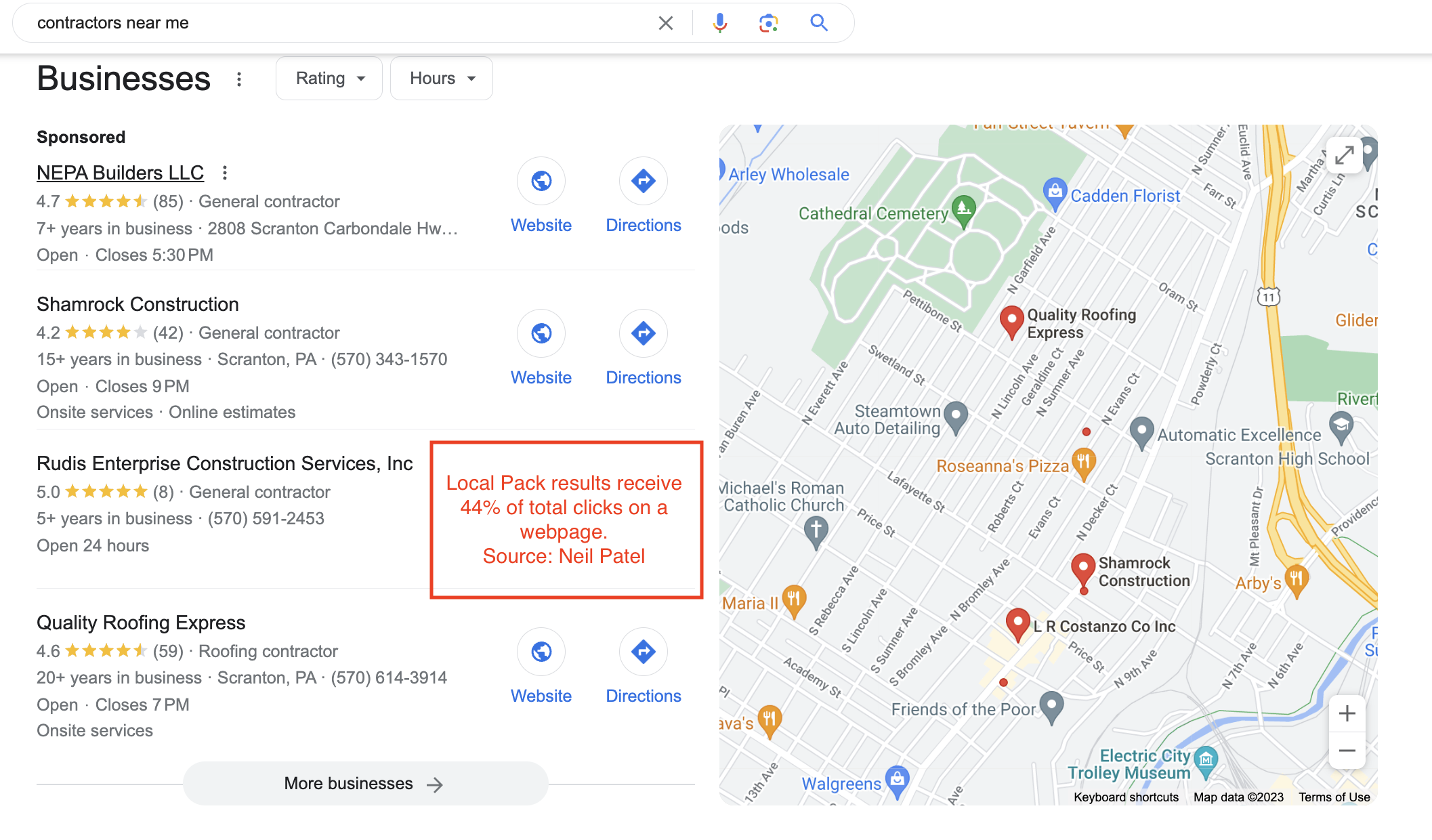 Why Do Contractors Need Local SEO?
Why Do Contractors Need Local SEO?
The primary benefit of local SEO for contractors is that it helps drive leads to your business. However, there are several ways that local SEO can benefit your contracting or construction business.
- Drives leads via direct traffic, as well as through referrals.
- Promotes brand awareness across multiple channels (i.e., Google search, your website, social media, directories, etc.).
- Manage your online reputation.
Working with a qualified agency or hiring white-label services to boost your local presence can help drive these results.
But if you are on a limited budget or want to try your hand at local marketing, we’ve outlined nine effortless and straightforward ways to drive leads to your business via local SEO.
The PROVEN 9-Step, Local SEO Guide for Contractors
Step 1: Optimize Your Google My Business Page
We’ve spoken a lot about “near me” searches, but we have talked little about the local pack results.
Essentially, most local searches on a Google query trigger this little box, also called a local pack, with different website listings assorted geographically, by review, and by intent.
To show up for one of these searches in a local pack, you need to create a Google Business Profile.
It’s essentially this little result that pops up whenever you search for a business in any geographic location.
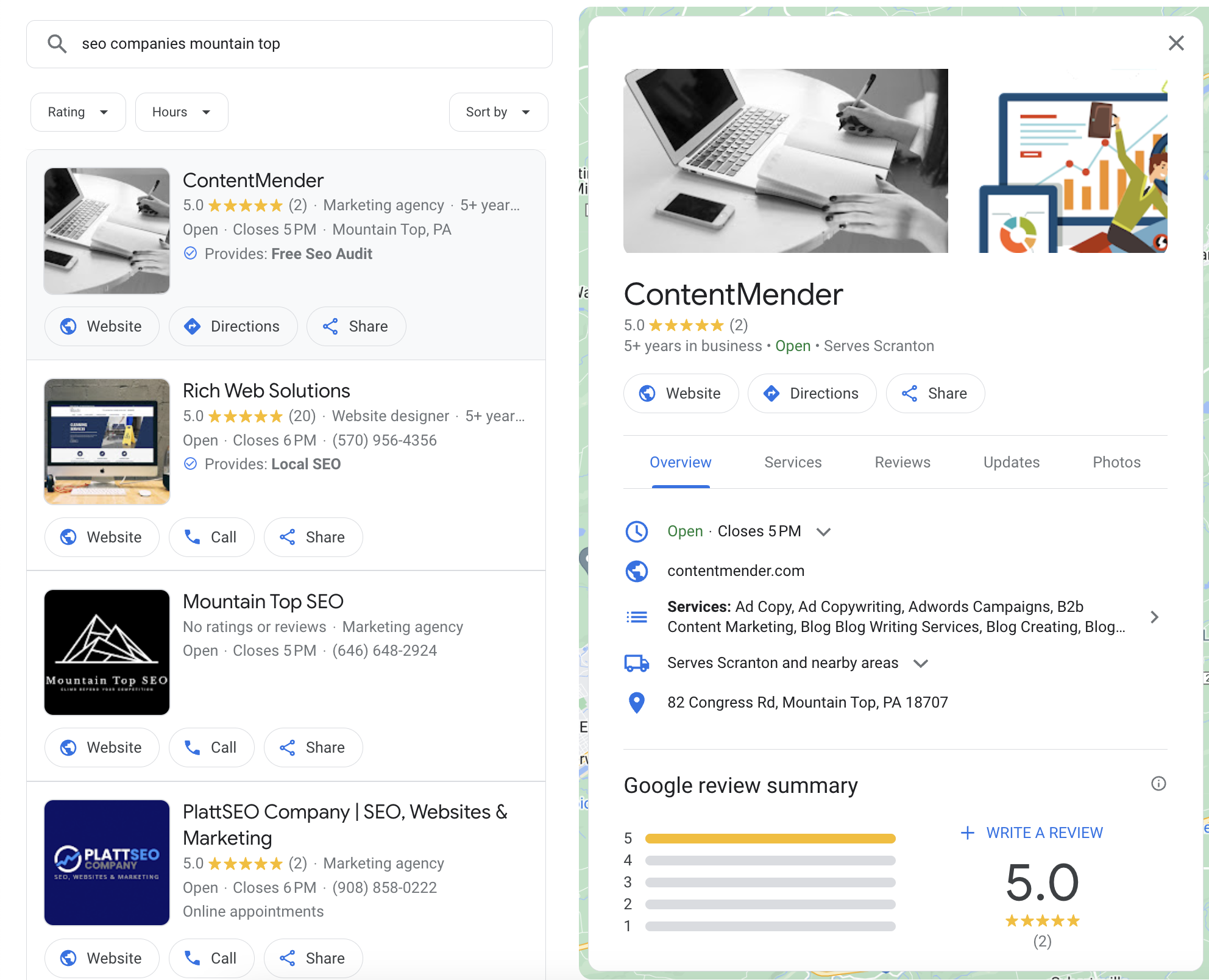 According to research, around 46% of all Google searches have local intent. Of that number, most local searches tend to be on mobile devices for “near me” searches.
According to research, around 46% of all Google searches have local intent. Of that number, most local searches tend to be on mobile devices for “near me” searches.
As previously mentioned, local 3-pack searches for “near me” gather at least 44% of clicks on a webpage, driving a significant source of traffic to your website.
For this reason, if your construction business wants to rank for local pack searches, it needs to optimize its Google Business Profile. Creating a Google Business Profile is free and super easy; click here.
How to Optimize Your Google Business Profile Listing
Once created, be sure to follow these tips to ensure your profile is properly optimized to rank for local searches:
- Maintain a consistent name, address, and phone number information (NAP)
- Provide ways to contact your business (phone number, store hours, website, etc.)
- Provide a brief description of your business in an About section
- Provide a list of products with prices and quotes, if applicable
- Provide important updates around events or content you create
Generally, most “near me” searches will show results for businesses based on distance and even slight keyword variations, so being thorough with your account information is crucial.
Step 2: Submit Your Website to Local Directories
Next, you’ll want people to find your construction company through trusted websites that many people use to find contractors. For construction companies and general contractors, a list of websites might include:
- Angi
- Blue Book
- Yelp
- Construct Connect
- Better Business Bureau
- Construction.com
- Home Advisor
- Iambuilders.com
Follow the same rules listed above when filling out your account on each website, ensuring your information is correct and contact information is readily available.
These websites will significantly boost referral traffic to your site, especially if you cultivate positive reviews from users on these platforms. (More on that later)
Step 3: Optimize Your Website with Local Keywords
Optimizing your website for local keywords helps you rank for:
- “Near Me” searches
- City/Region-specific keywords
For example, if someone wants to find pizza in Old Forge, Pennsylvania–the Pizza Capital of the World–they would be bombarded by results from Google’s traditional search page and its Google Business Profile listings.
Thus, optimizing your website with location-specific keywords, such as “Old Forge Pizza,” lets you rank in both results.
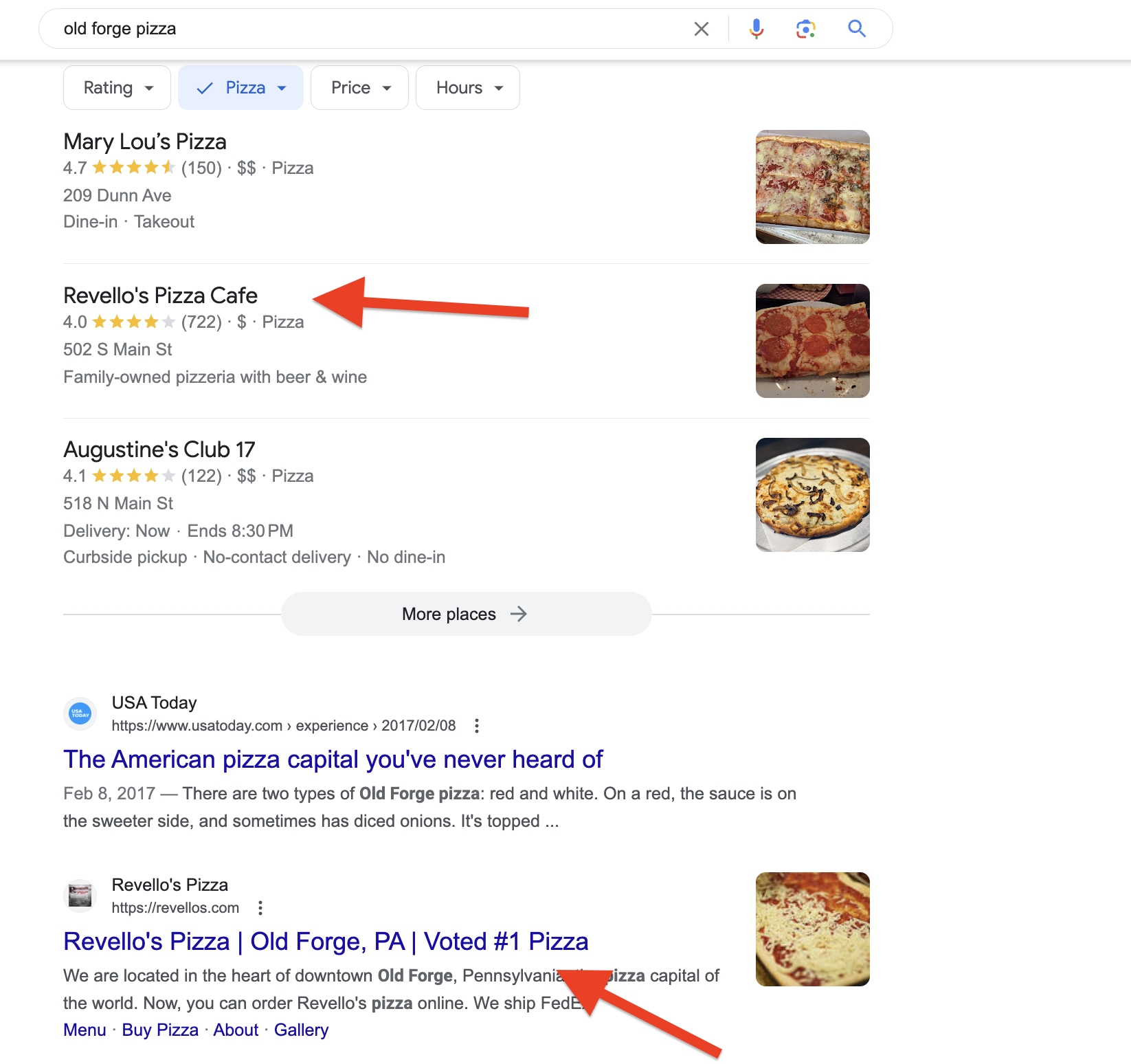 That’s 2X the organic real estate you get in local searches, keeping your business top-of-mind.
That’s 2X the organic real estate you get in local searches, keeping your business top-of-mind.
The benefits of this include:
- ↑ Click-Through Rate (The % of people who click on your result)
- ↑ Impressions (The # of times someone sees one of your results)
- ↑ Total Traffic (The amount of people who visit your website)
How to Optimize Your Website for Local Search
To get started, use your favorite keyword research tool, such as Google Ads, which provides free use as long as you sign your business up for an advertising account, which is free.
Type in a common keyword phrase, such as “contractor Brooklyn,” and check out the results.
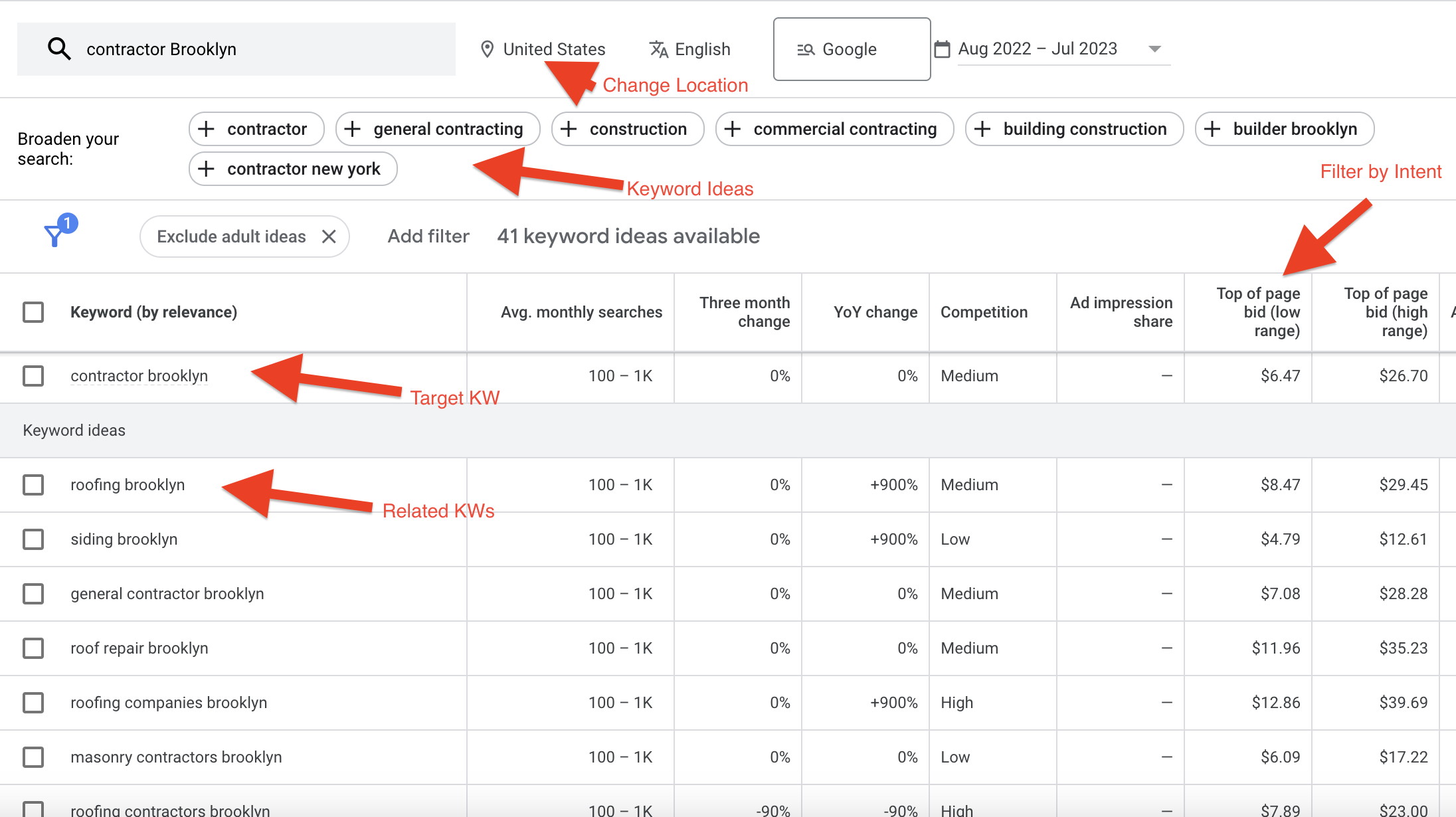 Choose relevancy over volume.
Choose relevancy over volume.
Choosing lower volume keywords with better intent, such as “commercial construction company Brooklyn” or “road construction company Brooklyn,” may not net you the most traffic, but it will bring you the most qualified traffic.
Filter By Intent
Keywords with higher Top-of-Page bids tend to be more commercial, while lower bids tend to be more informative.
Look for Competitor Keywords
Google Ads allows you to see which keywords your competitors are ranking for.
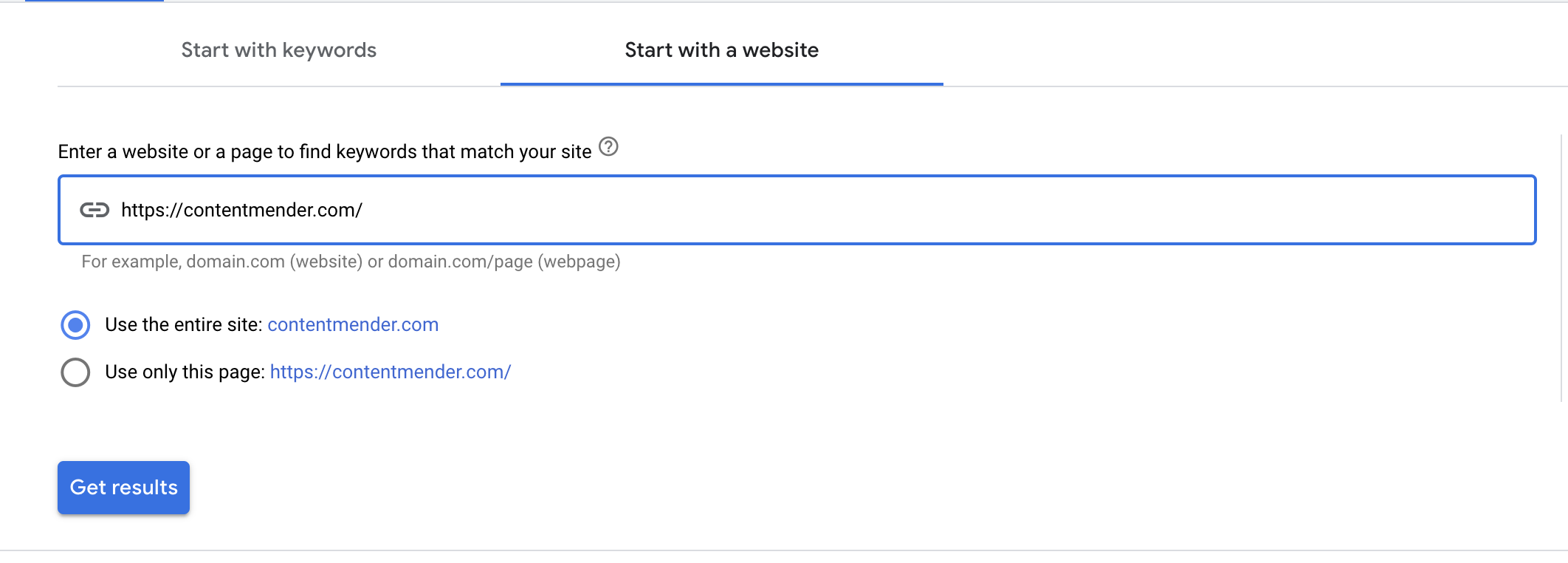 Bonus: Look for keywords with lower competition that are easier to rank for.
Bonus: Look for keywords with lower competition that are easier to rank for.
Once your list is assembled, optimize the following metadata with your target keywords:
- Title Tags: The 60-character clickable title on all Google results pages.
- Meta Description: The 160-character description underneath the title in the results.
- Page Content: Use keywords in opening paragraphs, headers, and naturally throughout.
Step 4: Create Location-Specific Pages
The number #1 mistake we see most companies make repeatedly is ignoring the importance of location-specific pages.
Let’s say you own a contracting business in Austin and serve the surrounding metropolitan and suburban areas.
Most companies only have one page (i.e., their homepage) covering the entire region. But if you live in Four Points and search for contractors, you’re more likely to see results for contractors headquartered in Four Points.
To account for this, you can create location-specific pages for each specific metro you seek to target.
Take this example from a pest company we worked with to create location pages all across northeast Pennsylvania.
 On each page, we list the different little towns and cities each location services, so when people search for an exterminator from a small town, this client shows up.
On each page, we list the different little towns and cities each location services, so when people search for an exterminator from a small town, this client shows up.
(Optional) If you have multiple locations in your business with different addresses and phone numbers, you absolutely should create individual Google Business Profile Pages.
Step 5: Optimize Your Website for Mobile
Did you know that most mobile searches are for local businesses?
This makes mobile rendering and optimization very important to the well-being of your business.
To optimize your website for mobile, follow these steps:
- Limit the number of clicks it takes to make a conversion.
- Limit the amount of scrolling.
- Insert click-to-call buttons on every page for easy contact.
- Make location information clearly visible.
- Reduce the amount of scrolling (this increases page speed!).
- Limit the amount of top-navigation pages (keep it to essential services).
- Build a fast website (use responsive web design, limit the amount of code, and compress images).
- Use high-quality images to entice clicks.
- Create a clear CTA on the front of your homepage.
If you focus on page speed and limit the time necessary to scroll on your site, your website will earn more calls and more leads.
Step 6: Write Local Content
On the flip side, it doesn’t hurt to create a separate section of your website for a local blog. Creating a local blog is a great way to showcase community exposure and educate your customers about various topics.
Discover topics trending in your area using your keyword research and social media prowess. For example, industries like plumbers can benefit by providing helpful tips to fix and unclog pipes that keep your business top-of-mind.
You can also use content to discuss volunteering or press releases related to your business that can be shared on social media. Follow our tips for SCORE blog writing to ensure your blogs are properly optimized for search and user intent.
Step 7: Acquire Links from Independent Websites
To continue with this point, the more content you create, the more links you’ll naturally gain over time.
While lots of controversy surrounds backlinks, the data clearly shows that backlinks build authority for your website and generate traffic.
However, most local construction companies must reach out manually to build links. This strategy includes contacting local bloggers and websites that frequently rank and review businesses in your area. For example, you could conduct an interview or request a mention on a relevant blog to earn an easy link.
In addition, run your business through a citation checker and reach out to any blogs that mention your website but don’t link to it.
Step 8: Get Positive Reviews
Finally, if you want to create the right kind of exposure for your business, you should build positive reviews. While many people frown on manipulating reviews, asking for reviews after a successful contract or business engagement isn’t unethical.
You’ll want to manage reviews on external websites like Facebook, Yelp and local directories by responding to positive and negative reviews with solutions.
According to one source, 92% of customers are more likely to purchase a product if they’ve read a positive business review. Reviews are tantamount to success for construction SEO because contracts are typically expensive and require more upfront trust than other service-based businesses.
For this reason, cultivating positive reviews on all of your platforms is essential.
Step 9: Grow Your Social Media
While most social media for brands has waned in importance over the years, it’s still a great place to showcase projects and earn more referrals.
Facebook is a great place to invite people to like your page and earn local word-of-mouth referrals in the area. Facebook Marketplace is also a great place to advertise services, similar to a Craigslist or Angi referral site.
Instagram is purely optional but a good place to showcase projects your business has finished and earn more referral traffic.
What Should You Put in Your Construction Local SEO Checklist?
- Submit your business to all local directories (ex., Better Business Bureau)
- Optimize your Google My Business Page
- Ensure proper NAP (name, address, phone number) on all third-party sites
- Customize your website for mobile search with click-to-call buttons
- Optimize your website, all metadata, and headers for local search using local keyword research
- Reach out to all websites with a brand mention and request a link
- Build a social media profile on sites like Facebook and Instagram to show off your work
- Create local content
- Host events or volunteer to acquire local exposure
- Reach out to local businesses you’ve worked with for a link and a review
- Respond to all reviews with a positive or helpful response
Read More: Local SEO Checklist.
Local SEO for construction companies should be an essential part of your business strategy, whether you’re established or growing.
In addition, local SEO is a great online strategy to break into a new geographic market without an established customer or referral base.
To get started with local SEO, contact us at ContentMender below to learn more about how we can help your construction business, or read our blog for more local SEO tips.

